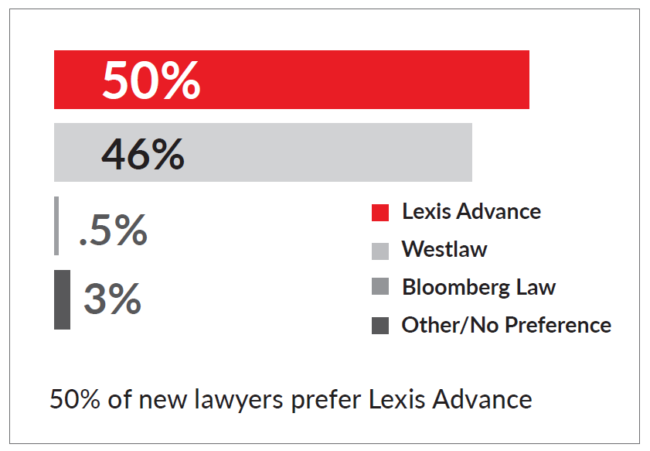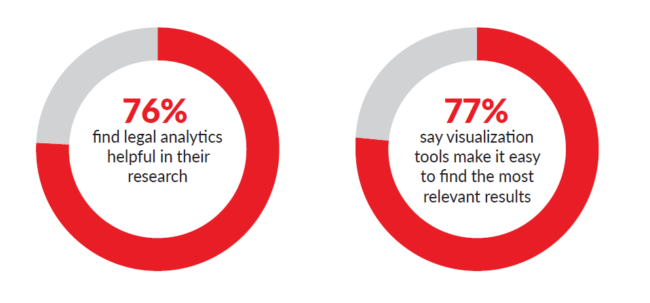If you had to guess which legal research service law students prefer, you’d probably answer Westlaw. After all, back in the early days of legal research, West pioneered the idea of giving law students free access in the hope of creating career-long customers.
But a survey published today finds that law students have a new favorite, Lexis Advance. The survey, commissioned by LexisNexis Legal & Professional and conducted by the independent research group PwC Research, part of PwC LLP in the UK, polled 5,051 law students at 201 ABA-accredited U.S. law schools.
In what LexisNexis is calling the Next-Gen Legal Tech Study, law students were asked which is their preferred platform for legal research. Of those surveyed, 50% said Lexis Advance, compared to 46% who said Westlaw. Another 0.5% said Bloomberg Law, 0.5% said other, and 2.5% said they had no preference.
Asked what drove their preference (whichever platform they answered), the top factor was ease of use (73%), followed by ability to find information quickly (62%). Other factors that drove their preference were attractive design, satisfaction with search results, and depth and breadth of content.
The survey further found that law students believe it is helpful to use newer research tools such as visualization, analytics and artificial intelligence. Seventy-six percent said they find analytics helpful in their research and 77% said they find visualization helpful.
These findings, LexisNexis says, validate its own internally conducted surveys in recent years that have shown a growing preference among law students for Lexis Advance over other legal research platforms.
The bigger takeaway, LexisNexis suggests, is that this validates that its platform has the features that Gen Z-ers prefer. As these law students become lawyers, these are the features they will want available to them in their firms.
“Change is coming as these next-generation attorneys have evolving expectations about tech,” Paul Speca, vice president and general manager, Large Law and Law School Market at LexisNexis, told me during a briefing on the survey results. “Our tools are very native to them and they’re very comfortable with them.”
In recent years, LexisNexis has invested heavily in integrating analytics and visualization tools within Lexis Advance. In 2015, it acquired Lex Machina, a pioneer in litigation analytics, and in 2017, it acquired Ravel Law, which developed visualization tools for legal research as well as its own judge analytics.
Last year, it launched a consolidated suite of analytics tools, Lexis Analytics, putting a “stake in the ground” to claim the analytics space.
According to this survey, those investments are paying off, at least among law students.
When students were asked to score the analytics and visualization tools of different research platforms, Lexis Advance outscored Westlaw.
Specifically, they were asked to score on a scale of 1-7 – with 7 representing strongly agree – their agreement with this statement: “X provides the most effective AI/Analytical tools to help me perform legal analysis or draft legal memoranda.”
Seventy-seven percent of students gave LexisNexis a score of 5, 6 or 7, while 68% gave Westlaw a score in that range.
With regard to visualization tools, they were asked to score each company on their agreement with this statement: “X visualization tools makes it quick and easy to find the most relevant results.”
Here, 80% of students gave LexisNexis scores of 5, 6 or 7, while 59% gave Westlaw scores in that range.
Students also indicated a generic preference for using visualization tools, with 77% saying they find them either somewhat or extremely helpful for identifying the most relevant research results.
Another area in which Lexis outscored Westlaw in the survey was training. The survey asked to score companies based on their agreement with this statement: “X Company training prepares me for success in the legal community.”
Seventy percent gave LexisNexis scores of 5, 6 or 7, compared to 48% giving scores in that range to Westlaw.
Scoring was somewhat closer when students were asked about the two companies’ citators, Shepard’s from LexisNexis and KeyCite from Westlaw. Asked to indicate their agreement with the statement, “X is an excellent citation service,” 77% gave Shepard’s scores of 5, 6 or 7, while 72% gave scores in that range to KeyCite.
Speca said that not only has LexisNexis invested heavily in modernizing its platform in recent years, but it has also invested heavily in its law school program. It has a network of more than 500 student representatives, offers a variety of live and on-demand training programs, and provides certification in basic and practical research.
Still, Speca said, most law school faculty were trained on Westlaw and have a tendency to lead with it in their classrooms. This survey should help them understand that the next-generation of lawyers is doing research in a different way, he said. “This should cause them to open their eyes.”
To access the full Next-Gen Legal Tech Report, click here.
 Robert Ambrogi Blog
Robert Ambrogi Blog

